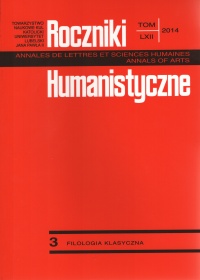The Sophists on the Correctness of Language
Abstract
This article examines the specific linguistic theory discussed by the sophists. The sophists’ insistence on precision in the language was rooted in their mastery of rhetoric. The main aim of this article is to describe the category of correctness in language and the status of different norms concerning language usage established by the sophists. The purpose of this article is also to explain how Protagoras and Prodicus used the concept of correctness (orthos) in order to distinguish the difference between a pair of similar words (apparent synonyms) and to apprehend the correct meaning of them. It is further shown that the sophists’ interest in proper language usage is far more than Plato’s ironic remark on this issue.
References
Basset L.: Aristote et la syntaxe, w: Syntax in Antiquity, ed. P. Swiggers, A. Wouters, Leuven: Peeters 2003.
Capizzi A.: Protagora. Le testimonianze e i frammenti, Firenze: G. C. Sansoni 1955.
Clapp J.G.: Some Notes on Plato’s Protagoras, „Philosophy and Phenomenological Research” 10.4 (1950), ss. 486-499.
Dąmbska I.: Wprowadzenie do starożytnej semiotyki greckiej, Wrocław: Ossolineum 1984.
Danielewicz J.: Liryka starożytnej Grecji, Wrocław: Ossolineum 1984.
Di Cesare D.: La semantica nella filosofia greca, Roma: Bulzoni 1980.
Forbes P.B.R.: Greek Pioneers in Philology and Grammar, „The Classical Review” 47,3 (1933), s. 105-112.
Fraser P.M., Matthews E.: A Lexicon of Greek Personal Names, Oxford: Clarendon Press 1987–2000
Friedländer P.: Die platonischen Schriften, Berlin–Leipzig: Walter de Gruyter 1930.
Gagarin M.: Kata Ton Orthotaton Logon: Correct Argument in the Sophists and Early Orators, Rethymno 2004.
Gagarin M.: The Purpose of Plato’s Protagoras, „Transactions and Proceedings of the American Philological Association” 100 (1969), s. 133-164.
Gajda J.: Sofiści, Warszawa: Wiedza Powszechna 1989.
Gomperz T.: Griechische Denker, Berlin–Leipzig: Walter de Gruyter 1922.
Graeser A.: On Language, Thought, and Reality in Ancient Greek Philosophy, „Dialectica” 31 (1977), s. 360-388.
Hubbard B.A.F., Karnofsky E.S.: Plato’s Protagoras, a Socratic commentary, London: Duckworth 1982.
Jaeger W.: Paideia, przeł. M. Plezia, H. Bednarek, Warszawa: Fundacja Aletheia 2001.
Kaczmarkowski M.: Językoznawstwo w „Kratylosie” Platona, w: Platon, Kratylos, Lublin: RW KUL 1990, s. 7-36.
Kaczmarkowski M.: Problematyka językoznawcza w „Kratylosie” Platona, „Summarium” 11-12 (1982-1983), s. 41- 53.
Kaczmarkowski M.: Świadomość językowa w „Kratylosie” Platona, „Roczniki Humanistyczne”, 33 (1985), z. 6, s. 19-28.
Kerferd G.B.: The Future Direction of Sophistic Studies, w: The Sophists and Their Legacy. Proceedings of the Fourth International Colloquium on Ancient Philosophy, ed. G.B. Kerferd, Wiesbaden: F. Steiner 1981.
Kerferd G.B.: The Sophistic Movement, Cambridge: Cambridge University Press 1981.
Komornicka A.M.: Simonides z Keos. Poeta i mędrzec, Łódź: Ossolineum 1986.
Lana I.: Protagora, Turin: [b.w.] 1950.
Lewandowska K.: Sofistów studia na językiem. Protagoras z Abdery, „Littera Antiqua”, nr3, Lublin 2012, s. 83-104
Luhtala A.: On Definitions in Ancient Grammar, w: Grammatical Theory and Philosophy of Language in Antiquity, ed. P. Swiggers, A. Wouters, Leuven: Peeters 2003.
Marrou H.I.: Historia wychowania w starożytności, przeł. J.S. Łoś, Warszawa: PIW 1969.
Mullach F.G.A.: Fragmenta philosophorum graecorum, Paris 1860-1861, t. 2, s. 58, przeł. J.Gajda, w: Gajda J.: Sofiści, Warszawa: Wiedza Powszechna 1989.
Murray G.: The Beginnings of Grammar, or First Attempts at a Science of Language in Greece, w: Greek Studies, Oxford: Clarendon Press 1946.
Nestle W.: Vom Mythus zum Logos, Stuttgart: A. Kröner Verlag 1942.
Reale G.: Historia filozofii starożytnej, t. I: Od początków do Sokratesa, przeł. E.I. Zieliński, Lublin: RW KUL 1993.
Reesor M.E.: The Stoic ΙΔΙΟΝ and Prodicus’ Near-Synonyms, „American Journal of Philology” 104 (1983), s. 124-133.
Schmid W., Staehlin O.: Geschichte der griechischen Literatur, t. I, cz. 3, 5, München: Becks 1940-1948.
Swiggers P., Wouters A.: The Concept of “Grammar” in Antiquity, w: History of Linguistics in Texts and Concepts, hrsg. von G. Haßler, G. Volkmann, Münster: Nodus 2004.
Traill J.S.: Persons of Ancient Athens, Toronto 1994.
Wolanin H.: Słowotwórstwo w myśli językoznawczej starożytnej Grecji. Od Homera do Dionizjusza Traka, Kraków: PAU 1996.
Wróblewski W.: Literacko-językowe zainteresowania sofistów, w: W kręgu Platona i jego dialogów, red. W. Wróblewski, Toruń: Wydawnictwo UMK 2005.
Wróblewski W.: Miejsce poezji w pedagogicznej działalności Protagorasa z Abdery w świetle platońskiego dialogu Protagoras, w: W kręgu Platona i jego dialogów, red. W. Wróblewski, Toruń: Wydawnictw UMK 2005.
Copyright (c) 2014 Roczniki Humanistyczne

This work is licensed under a Creative Commons Attribution-NonCommercial-NoDerivatives 4.0 International License.





